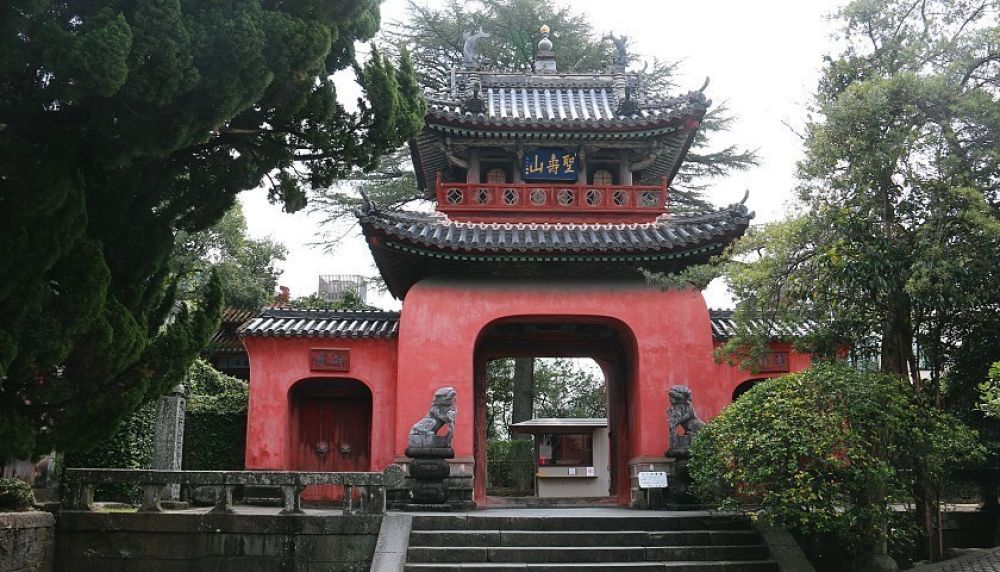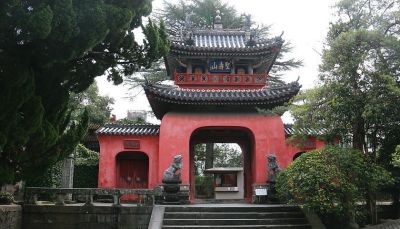

Take a guided tour of Fumon-in Kyakuden, a majestic hall within the Sofukuji Temple grounds. Visitors are enlightened about the influence of Chinese architecture on this building as its style significantly differs from typical Japanese structures. The hall's bright red columns, intricate carvings, and calligraphy are a testament to the cultural exchange between China and Japan during the Edo Period. Expect to hear anecdotes about the hall's historic significance and details about the temple's role in welcoming Chinese immigrants to Nagasaki. The tour provides visitors with a rare look at artifacts and writings that are not frequently displayed to the public, offering a deep dive into the synergy of two distinct cultures.
Embark on an immersive experience by exploring the Daiippomon Gate, the impressive entrance to the Sofukuji Temple. This tour explains the gate's role as a spiritual 'cleansing station' for visitors before they approach the main temple. Learn about the architectural details and significance of the guardians represented by the statues at the gate—known to fend off evil spirits. The guide will share insights into the restoration efforts that help maintain the resilient structure despite the challenges of weather and time. Participants will gain a newfound appreciation for the craftsmanship and dedication required to preserve such a historic landmark.
Experience a serene meditative session at Sofukuji Temple, where the air is subtly perfumed with the scent of burning incense. This activity includes a short introduction to Zen meditation practices followed by a guided session aimed at promoting spiritual well-being. Learn about the significance of incense in Buddhist rituals and its role in creating a contemplative atmosphere. Participants will have the opportunity to take a moment away from the rush of daily life and find tranquility within the ancient walls of the temple, absorbing the harmonious balance of mind and body that meditation offers.
The Sofukuji Tea Ceremony is a cultural activity that offers a hands-on experience with one of Japan's most cherished traditions. Held in a designated tea room with views of the temple's manicured gardens, the ceremony is conducted by tea masters who meticulously prepare matcha in accordance to centuries-old practices. Participants learn about the philosophy behind each movement and gesture, as well as the tools used to create the perfect bowl of tea. The soothing environment, combined with the delicate flavors of the matcha, provides a sensory journey into the heart of Japanese culture.
Delve into the arts of paper folding and Japanese calligraphy in a combined workshop set within the tranquil environment of Sofukuji Temple. Specialist instructors guide guests through the delicate process of transforming a simple piece of paper into intricate origami structures, a practice said to promote mindfulness and creativity. Afterward, transition to the art of calligraphy, where you will learn basic strokes and techniques to craft beautiful Japanese characters, providing a deeper connection to the language and cultural heritage. This workshop is a unique opportunity to engage with traditional Japanese art forms in an inspiring and historic setting.
Join an educational walk around the Sofukuji Temple complex, led by knowledgeable guides with deep understanding of the temple's history. The walking tour covers the origin of the temple, its founding by Chinese Zen master Chaonian in 1629, and its connection to the Obaku school of Zen Buddhism. As visitors walk between the temple's different structures, they will uncover stories of the past, including the historical ties between Nagasaki and China, and the role of the temple as a sanctuary for Chinese immigrants. The temple's various features, including the Grand Hall, the Lecture Hall, and the pagoda will be explored, revealing their individual significance and the overall importance of Sofukuji in Japan's cultural tapestry.
This contemplative activity provides a scholarly excursion into the world of Buddhist sculpture at Sofukuji Temple. Participants will be guided through a variety of sculptures, each embodying the distinctive styles and teachings of Buddhism. From the lifelike statues of ancient monks to the imposing figures of deities, the session aims to impart an appreciation for the artistic craftsmanship and religious significance of these works. The guide will also explain the symbolism and iconography present in the sculptures, deepening visitors' understanding of how art conveys the teachings and values of Buddhism.
